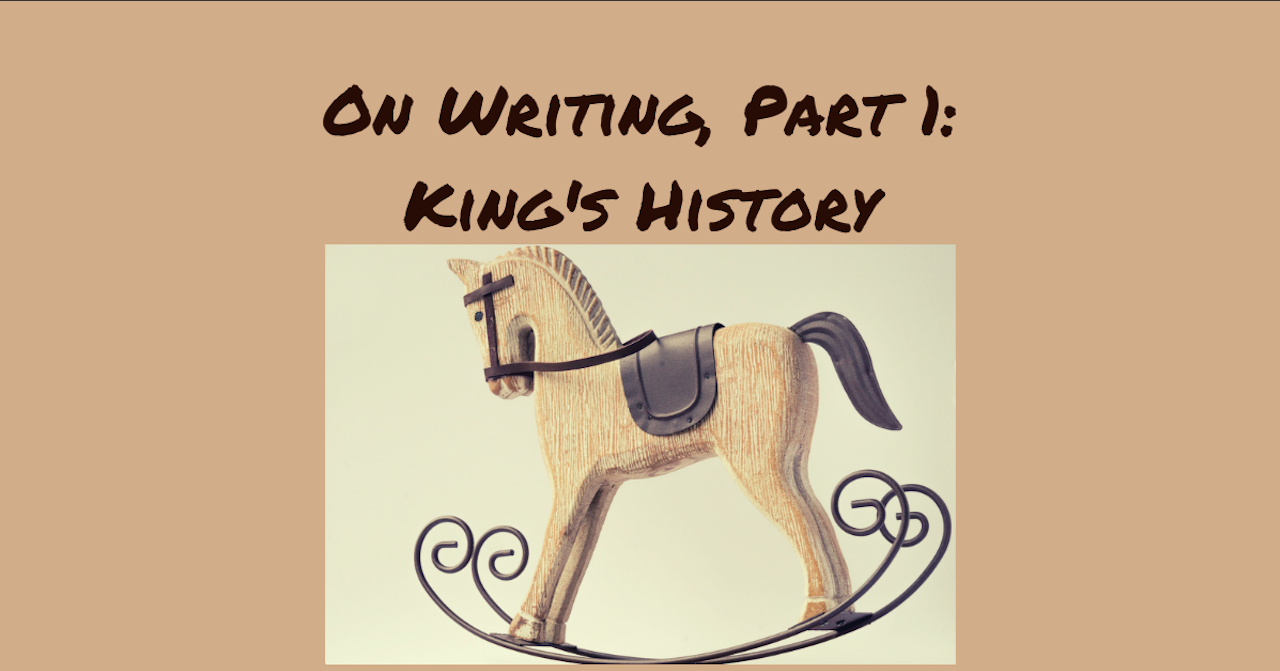Because everyone loves a good story
On Writing, Part 1: King’s History

Stephen King’s On Writing: A Memoir of the Craft begins not with the craft but with the memoir—a hundred pages of backstory by way of autobiography.
King has published some pretty spooky stories, which causes one to wonder what made his insides so scrambled. He indirectly answers that by relating a handful of vignettes from his childhood and adolescence. The stories aren’t all awful…but most of them are. King isn’t out for sympathy, though; as he relates the stark facts of childhood woes, he’s out for laughs and probably cringes. He got both from me.
Squeamish Readers, Beware!
For example, his earliest memory is of pain. At two years old he had managed to pick up a cinderblock and began to carry it across the garage floor. It wasn’t long before a wasp that resided in that piece of masonry flew out and stung his ear. “It was the worst pain I had ever suffered in my short life,” he says, “but it only held the top spot for a few seconds. When I dropped the cinderblock on one bare foot, mashing all five toes, I forgot all about the wasp” (19).

When he was in first grade, he got measles that turned to strep throat that turned to habitual ear infections. When his mother took him to the ear doctor, the man said, “Relax, Stevie, this won’t hurt.” The doctor then proceeded to lance Stevie’s eardrum with a huge needle. King remembers the pain being worse than the first month of recovery after later being hit by a van. He got this eardrum treatment three separate times.
And for misery rather than pain, his babysitter used to sit on his face, let rip a gigantic burst of flatulence, and yell, “Pow!” One time she fed four-year-old Stevie seven fried eggs for breakfast and then locked him in the closet to wallow in his vomit until his mother came home. Another time his brother convinced him to relieve himself in the woods, and he wiped his bottom with poison ivy. Imagine that recovery. …On second thought, don’t.
A Writer Is Born
It’s telling that the majority of his early memories are dismal rather than enjoyable. But King has some good memories, too, which is probably why he’s a published author rather than a convicted felon. For example, he fell in love with sci-fi, suspense, and scary movies as a boy, which whet his fetish for the macabre. He also discovered a love of reading during his convalescence from ear infections. Sure, he was reading comic books, but he enjoyed them enough to try some derivative stories of his own. And what’s more, he was pretty good.

He started by writing to impress his mother, and he progressed to helping with his brother’s family newspaper, selling a rehash of a scary movie he’d watched, contributing to his school newspaper, distributing a satirical version of said school newspaper (and getting busted for it), and working as a sports writer for the local paper. All through this process he submitted short stories to various magazines and collected an impressive stack of rejection letters.
Sweet Success
Finally, he describes his success with Carrie, his first novel. It progressed from idea to aborted project, finished draft, rejected manuscript, accepted manuscript, low-paying publication, and eventually to lucrative paperback. Tenacity prevailed. The gradual nature of his success is a glimmer of hope to aspiring writers as we grope our way through the darkness of pre-publication.
Before he made it big with Carrie, though, King met and married Tabitha, a clear-thinking writer who has been his strictest critic and biggest fan ever since. She cheered him on when he did well, encouraged him when floundered, and called an intervention when he nearly self-destructed from his drug and alcohol addiction. He spends many pages discussing his substance abuse and his regret over the years he wasted, but now he’s been sober since the late 1980’s, mostly due to his wife’s influence. His appreciation of Tabby is a frequent theme of his book, which was a lovely surprise to me.
While King tells plenty more stories in the book, I trust this was enough to sketch the outlines of his formation as a person and writer. But what about his actual writing advice? Fret not; that’s what we’ll dive into next time, beginning with the contents of a writer’s toolbox.
Source:
King, Stephen. On Writing: A Memoir of the Craft. Scribner, 2000.

Pingback: On Writing, Part 3: Good Habits – Past Watchful Dragons
Pingback: Past Watchful Dragons Meets Rabbit Room – Past Watchful Dragons
Pingback: Stephen King's "On Writing": An Introduction – Past Watchful Dragons
Can’t believe he didn’t turn out worse from some of those incidents! Although he has written some very dark books. Glad he had a great wife like mine to keep him on course. Great post babe! Excited to learn more.